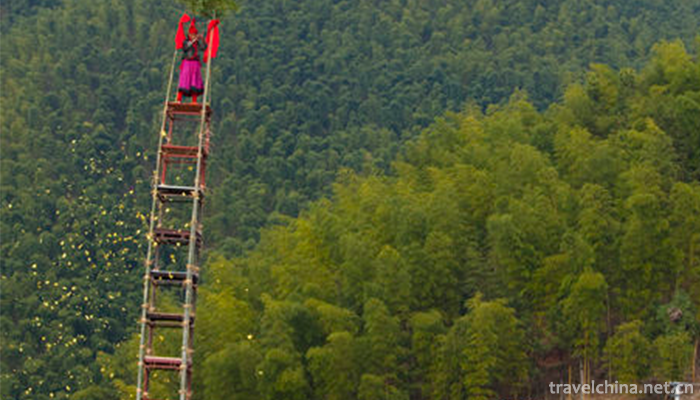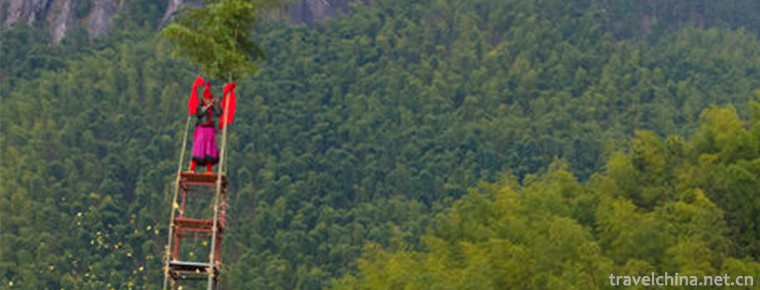Turn over to the nine floor
Turn over to the nine floor
The Ninth Floor, also known as the Ninth Floor, is a traditional folk activity popular in northeastern Fujian and southern Zhejiang. It is mostly used in rituals such as praying for rain, praying for blessings and disaster relief. The performance of turning over the ninth floor is simple, but the action is very dangerous. It was successfully selected into the national non-legacy list in 2008. With Xiaoshan becoming more and more famous for "turning over the ninth floor", the performing area has gradually expanded from Xiaoshan to Shaoxing, Zhuji and other surrounding cities.
In June 2008, Hangzhou and Dongyang City of Zhejiang Province declared that the ninth floor was turned over and listed in the second batch of national intangible cultural heritage list with the approval of the State Council.
historical origin
"Turn over the Ninth Floor ", also known as "hanging the Ninth Floor", was successfully selected into the national non-legacy list in 2008. The costume of the performance is simple, but the process is very dangerous. According to Xiaoshan local traditional folk custom, when people die, they need to "turn the ninth floor" to perform beyond the soul of death.
Talking about the origin of the ninth floor, it is derived from a long-standing traditional folklore. It was 226 years ago, when Qin Shihuang built the Great Wall, Meng Jiangnu went to the foot of the Great Wall to find her husband. When she learned that her husband had died in the process of construction, she burst into tears and set up a platform to shout for his grievance and surpass the soul of death, which caused the Great Wall to collapse. Since then, such a traditional folk custom has spread in the south of the Yangtze River. Its form of expression is to turn over the ninth floor, especially in the two towns of Puyang in front of Xiaoshan.
Folk activities
It's easy to perform on the ninth floor. Only four Chinese fir pillars, two folded tables and some fixed ropes are needed, while nine eight immortal tables can be borrowed from neighbors. When we got to the performance place, we began to set up a platform. We joined four wooden pillars into two 10-meter-long pillars. We found a flat place to fix them. Then we stacked nine eight immortal tables on top of them in turn and fixed them with ropes. On this basis, performers will also put two irregular small folded tables, table foot to table foot, as the "stage" of the performance. It's just that the "stage" is more than 10 meters high in the air. At the time of the performance, the loudspeaker suona blew up first. After the field became hot, the "ninth floor" began. At first, the performer has to make a "bottle-piercing" action. Only through the smooth passage can the performance continue. The performance began, and the performer first rolled over from the second eight immortals table below, and finally arrived at the small stack table. Then on the folding table, they perform the actions of grinding tofu up and down, Golden Chicken independence, boy worship Guanyin, inverted purple bell and swing. And all the performances, there is no security measures.
Qian Xiaozhan, the only heir of the Ninth Floor in Xiaoshan, was also named the representative heir of the national intangible cultural heritage. He said, "In fact, it is not easy to perform the Ninth Floor in peacetime." According to the folk custom, the main purpose of "turning over the ninth floor" is to die in excess of the dead soul. Therefore, we should be very careful. But once the performance is performed, even if it rains and winds, as long as the host does not stop, the performer must continue to perform. In fact, the "nine" of "turning over the ninth floor" is not an exact number, but an imaginary number, which means more. Qian Xiaozhan's turn over is called "Xiao Ninth Floor". There is also a "Big Ninth Floor". It is a pyramid shaped by 49 eight immortal tables. It does not even need to be fixed by wooden stakes. It is even more dangerous. However, the "Big Ninth Floor" has long been lost, leaving only "Xiao Ninth Floor".


-
1.Buluotuo
Buluotuo, the traditional folk literature of Ganzhuang Mountain in Baise, Guangxi, China, is one of the national intangible cultural heritages.
Time 2018-12-15 -
2.Guilin Yijiang Margin Scenic Spot
Guilin Yijiang Rim Scenic Spot is situated on the northwest tour line of Guilin with long corridor. It is 32 kilometers away from the urban area (321 National Highway Lingui Wutong Town Section).
Time 2019-01-13 -
3.jianchuan museum cluster
Jianchuan Museum is called Jianchuan Museum Settlement in Chengdu City. Founded by private entrepreneur Fan Jianchuan, it is located in Anren Town, Dayi County, a small museum town of China
Time 2019-01-21 -
4.Qinghai Tibet Plateau Wildlife Park
Xining Wildlife Park, also known as the Qinghai-Tibet Plateau Wildlife Park, is the only large-scale comprehensive wildlife park in the Qinghai-Tibet Plateau with the highest elevation
Time 2019-02-07 -
5.Tianlong Tunpu
Tianlong Tunpu Town is located in Pingba District, Anshun City, western Guizhou Province. Deep in the mountains of karst landform, Tiantai Mountain and Longan Mountain are two mountains
Time 2019-02-21 -
6.Eight treasures fragrant glutinous rice
Babao Xiangnuo is a famous dish in Zhejiang Province. It is cooked with glutinous rice as its main ingredient. It has the characteristics of soft glutinous rice and fragrant teeth.
Time 2019-03-26 -
7.Water splashing Festival
Dai Water-Splashing Festival is also called "Bath Buddha Festival". Dai language is called "Sangkangbimai" (meaning "New Year"). Dai people in Xishuangbanna Dai Autonomou
Time 2019-04-24 -
8.Hangzhou Reviews
Hangzhou commentary originated from the Southern Song Dynasty, and has a history of 800 years. It is the most characteristic local traditional folk art in Hangzhou, Zhejiang Province.
Time 2019-05-02 -
9.Lotus in Wenzhou
Wenzhou lotus is a local opera evolved from Wenzhou Taoism, and it is also one of the main operas in Zhejiang Province. It has spread to Wenzhou (including the counties under its jurisdiction) and par
Time 2019-06-28 -
10.Wudang Mountain Palace Viewing Taoist Music
Wudang Mountain Palace Taoist Music is the product of the combination of excellent traditional folk culture in Qinba area of Hubei Province and court music from Tang Dynasty to Ming Dynasty. It is the
Time 2019-06-30 -
11.Beijing Sport Univerrsity
Beijing Sports University was founded in 1953, formerly known as the Central College of Physical Education, renamed Beijing Sports College in 1956 and Beijing Sports University in 1993. It is a nation
Time 2019-09-06 -
12.Muli Temple
Muli temple is a key cultural relics protection unit in Sichuan Province. It is located at the foot of daniyabu mountain, youyidian village, Taoba Township, Muli Tibetan Autonomous County. It is more than 300 kilometers away from Xichang City
Time 2020-10-16